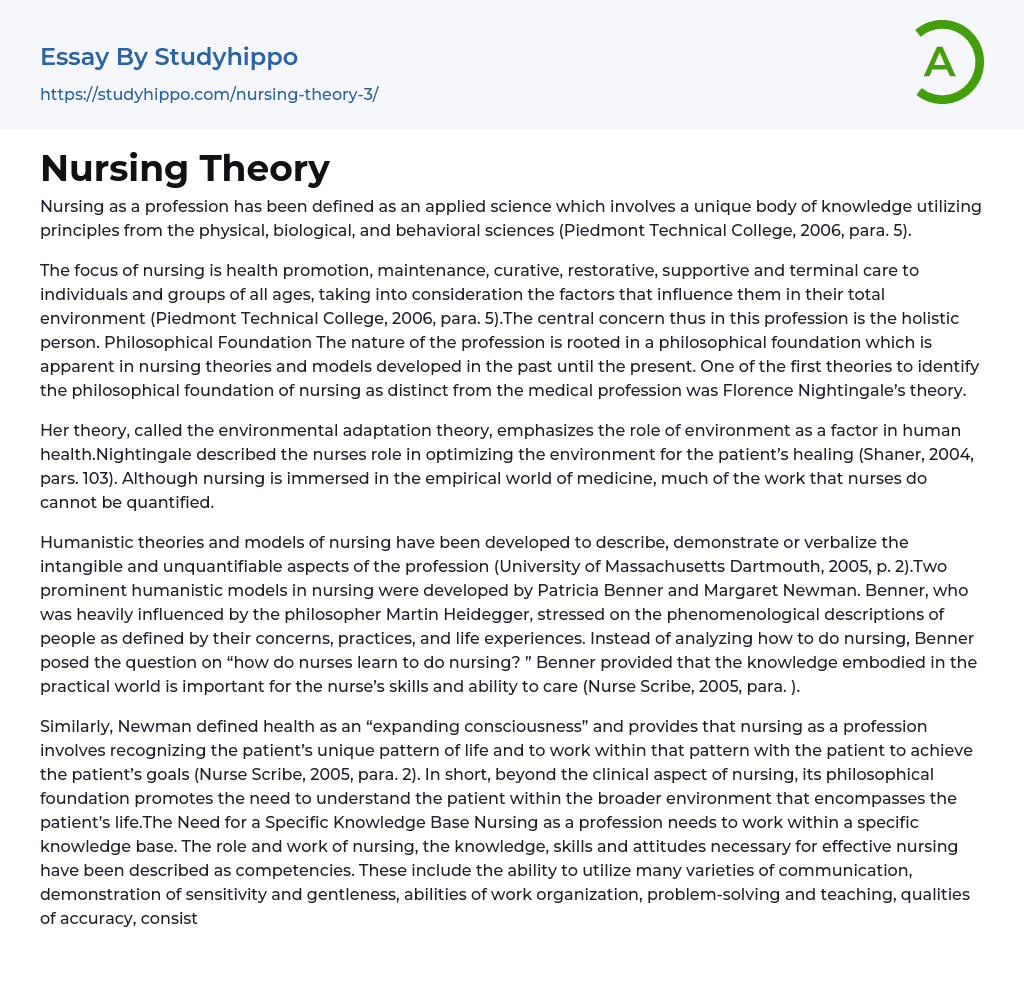The profession of nursing has been described as an applied science that utilizes principles from various fields, including the physical, biological, and behavioral sciences (Piedmont Technical College, 2006, para. 5).
Nursing encompasses health promotion, maintenance, curative, restorative, supportive, and terminal care for people of all ages and groups within their environment (Piedmont Technical College, 2006, para. 5). Thus, the main focus of nursing revolves around the holistic person. The nature of this profession is grounded in philosophy, which is evidenced through nursing models and theories that have evolved over time. Florence Nightingale's theory was one of the earliest to distinguish nursing's philosophical foundation from that of medicine.
The environmental adaptation theory, proposed by Nightingale, highlights the significance of environment in human health. Nightingale believed that it is a nurse's responsibility to ensure a healing environme
...nt for the patient (Shaner, 2004, pars. 103). Despite nursing being closely associated with medicine, a significant part of its work is not measurable.
The profession of nursing has inspired the development of humanistic theories and models, which aim to capture the intangible and unquantifiable elements of nursing (University of Massachusetts Dartmouth, 2005, p. 2). Two significant models that emphasize the human aspect of nursing were established by Patricia Benner and Margaret Newman. Benner, whose ideas were shaped by philosopher Martin Heidegger, focused on the phenomenological aspects of individuals, defined by their experiences, practices, and concerns. Instead of examining how nursing is performed, Benner posed the question "how do nurses acquire nursing skills?" She argued that practical knowledge is valuable for a nurse's capacity to provide adequate care (Nurse Scribe, 2005, para.).
According to Nurse Scribe (2005, para. 2), Newman defined healt
as an “expanding consciousness” and placed emphasis on nursing as a profession that recognizes the individuality of each patient's pattern of life and works within that pattern to achieve their goals. In essence, beyond the clinical aspect of nursing, its philosophical foundation emphasizes the importance of understanding the patient within the broader context of their life. Nursing as a profession requires a specific knowledge base that encompasses competencies in communication, sensitivity, organization, problem-solving, teaching, accuracy, consistency, thoroughness and continuity.
According to appropriate standards (Hird, 1995, “Valuing nursing”, para. 2), various activities are conducted in nursing using theories to describe, develop, disseminate and apply current knowledge. The nursing knowledge base helps in providing a framework for delivering seamless care and maintaining uniformity in terms of observation, focus, thinking and queries(Wilkerson, 2005, pars. 1-3).
Focusing on the humanistic aspect of nursing theory goes beyond treating disease and focuses on the practice of nursing as distinct from medicine. This approach, which centers on problem-solving related to human needs, aligns with the philosophical foundation of nursing as a profession. Nurses should avoid the attitude of merely following physician orders, and instead consider each individual patient's unique environment and its impact on their healthcare attitudes and experiences (Early Nursing Theories, 2002, pars. 2-3).
- Anatomy and Physiology essays
- Addiction essays
- Biodegradation essays
- Dental Care essays
- Disease essays
- Disorders essays
- Health Care essays
- Intelligence Quotient essays
- Nutrition essays
- Olfaction essays
- Public Health essays
- Women's Health essays
- World health organization essays
- Cancer essays
- Infectious Disease essays
- Lung Cancer essays
- Neurology essays
- Physical Exercise essays
- Medicine essays
- Sex essays
- Inquiry essays
- Disability essays
- Poison essays
- Action Potential essays
- Nervous System essays
- Childbirth essays
- Puberty essays
- Blood essays
- Kidney essays
- Neuron essays
- Body essays
- Glucose essays
- Sense essays
- Heart essays
- Skeleton essays
- Human Physiology essays
- Eye essays
- Immune System essays
- Muscle essays
- Skin essays
- Brain essays
- Central Nervous System essays
- Human Skin Color essays
- Digestive System essays
- Common sense essays
- Respiration essays
- alcoholism essays
- Smoking essays
- Casino essays
- Tobacco essays




